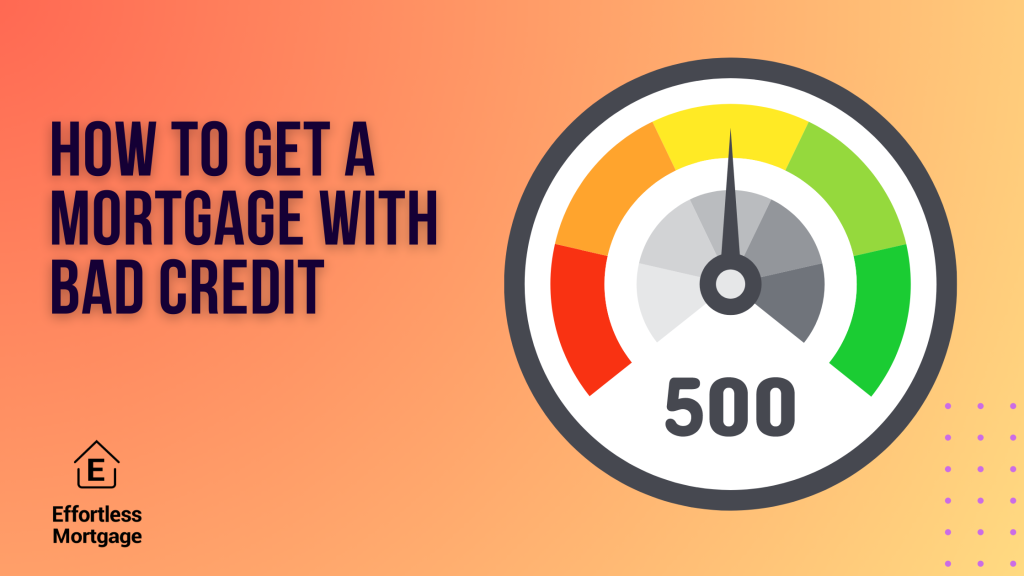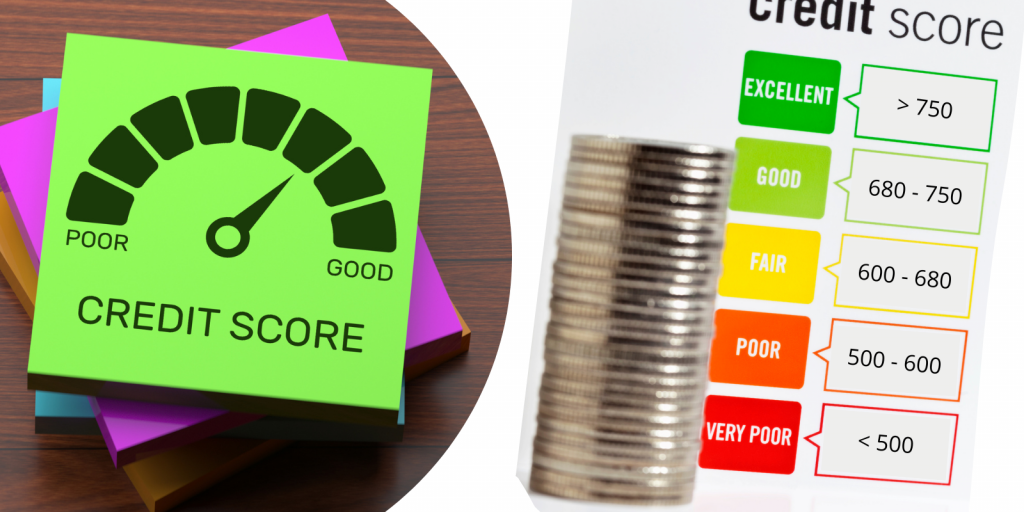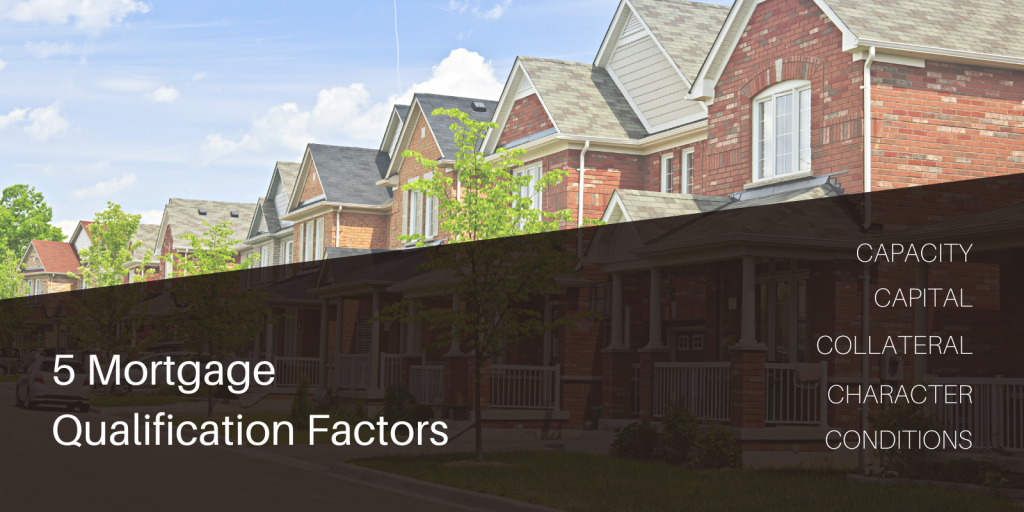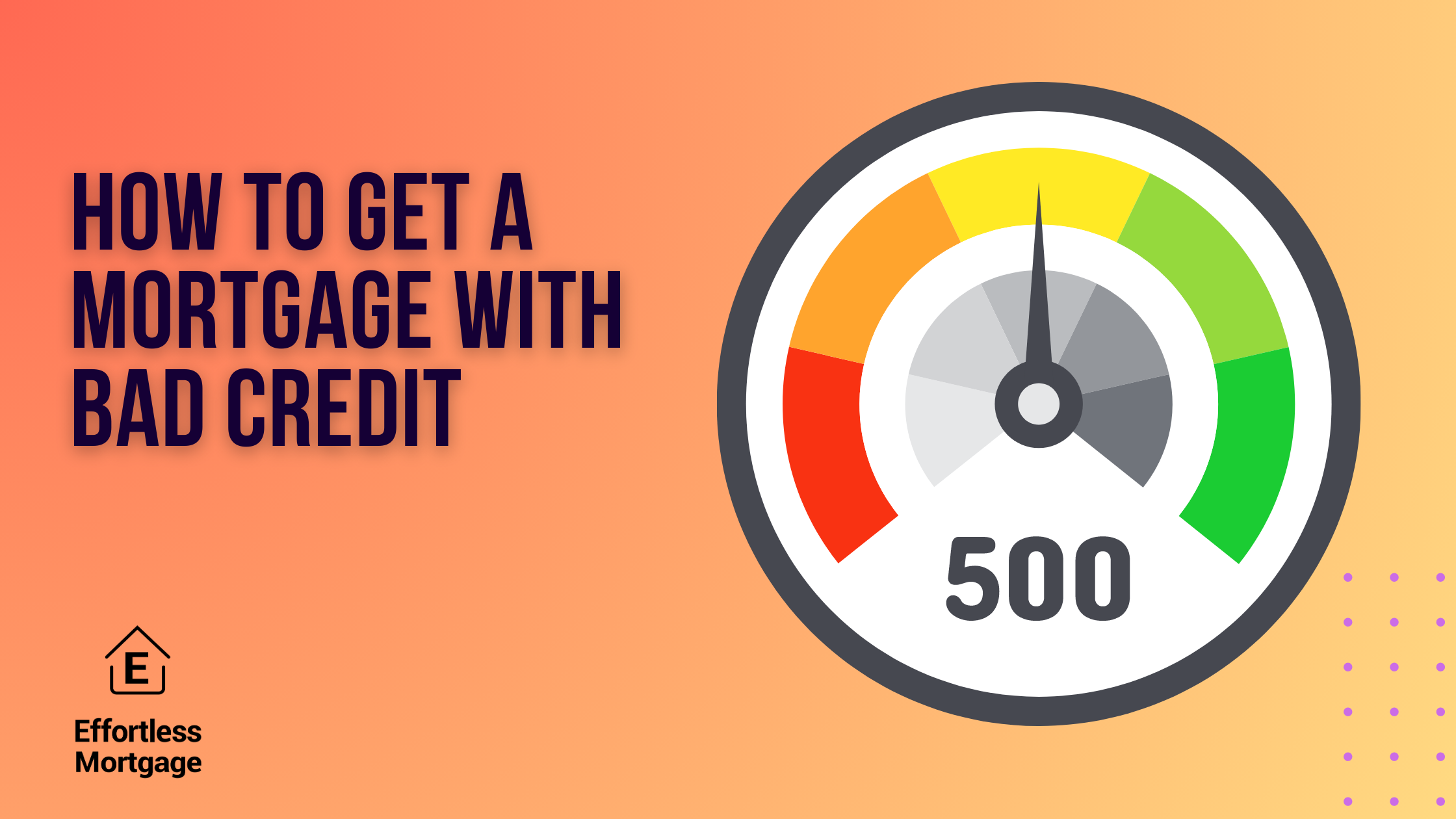
One of the questions we get asked a lot by homebuyers and homeowners alike is “Can I Get a Mortgage with Bad Credit“?
The answer is, “Absolutely, Yes”.
But there’s more to it. In this article, we will answer the following questions:
- What’s Considered Bad Credit?
- Who are the Bad Credit Lenders?
- How to Qualify for a Bad Credit Home Loan?
- Is getting a Bad Credit Mortgage good for you?
Hopefully after reading this article you will have a good idea on how to find the best mortgage financing options even if your credit is not perfect.
Let’s get started.
What's Considered Bad Credit?

There are four main aspect of your credit rating that determines your credit rating.
These are what mortgage lenders look at when they determine if someone’s credit is good or bad:
- Your Credit Score
- Your Payment History
- Your Credit Utilization
- Any Major Credit Event
Your Credit Score
The simplest way to put it is if your credit score is less than 600, it’s considered Bad Credit.
Anything between 600 to 680 is considered as Fair Credit. Credit scores greater than 680 is considered good credit. 750 and higher is considered excellent credit.
- Excellent: > 750
- Good: 680 – 750
- Fair: 600 – 680
- Bad Credit: < 600
Your Payment History
Even if your credit score is greater than 600, a mortgage lender may still turn down your application due to Bad Credit if you have poor payment history.
For example, if you had a few missed credit card payments that are 90 days past due, that is a major flag for lenders.
However, if you had an occasional missed phone bill, that was paid back quickly, it’s typically not a bit deal.
Mortgage Lenders will review your payment history to watch for patterns and signs of financial stress.
Your Credit Utilization
Your credit utilization is measured by how much of your available revolving credit products are being used up.
Example of revolving credit products including credit cards and If you have two credit cards and they are both maxed out, mortgage lenders would be very concerned about that.
Even if you have good credit score but with high utilization, you may still need a Bad Credit Mortgage.
Major Credit Events / Derogatory
There are 3 common types of Credit Events, with increasing severity. If you had any one of these in your credit history in the past 2 years, it’s considered Bad Credit no matter what your credit score is:
- Collections
- Consumer Proposal
- Bankruptcy
**Collection** is when you have an account that’s 90 days over due, whether it’s a credit card, a phone bill, or a car loan, and the vendor decided to send your file to a collections agency. A collection is going to really hurt your credit and it typically stays on your record for 7 years or longer.
**Consumer Proposal** is when you work with a credit agency to forgive part or all of your liabilities. It is more severe than a collection, because it typically includes writing off or reducing the amount due for more than one debt.
**Bankruptcy** is the more ‘severe’ of the three, where you ask for relief on all of your debt. You may need to sell all of your assets to pay off your creditors in exchange for a fresh start with your personal finances.
FYI — mortgages CAN NOT be included in bankruptcy. Many who filed bankruptcy need to get rid of all of their debt, but will still need to make mortgage payments.
If you are in an active Collection, Consumer Proposal, or Bankruptcy, you will not be able to get a mortgage until you pay them off, or get discharged.
If you currently own your own home and there’s equity, it’s a good idea to take out that equity to pay off the collections items, or consumer proposal.
The sooner you settle it, the less interest these liabilities will accumulate, the sooner you can get back on track.
If you do not currently own your own home and you are in an active Collection, Consumer Proposal or Bankruptcy, your best and only option is to try to pay it off and get discharged as soon as possible.
Our Advice: Please ensure you have confirmed with your Creditor or Trustee that you are discharged. We had a client who paid off a Consumer Proposal 10 years ago, but the formal records was never updated, so he was never properly discharged from the Consumer proposal based on his credit report. It caused him a whole lot of issue when applying for a mortgage, and he ended up having to wait for 2 more years before he could get approved. Just a tale of caution.
Now we talked about that you won’t be able to get a Mortgage while you are still in a Collection, Consumer Proposal or Bankruptcy.
How about after you pay them off? Let’s keep reading…
Can You Get a Mortgage After a Consumer Proposal or Bankruptcy?
The answer is yes, but it all depends on your down payment or home equity.
If you are looking to refinance your existing mortgage or take out a Home Equity Line of credit from, you will be able to borrow up to 80% of your home value right away. It is subject to the location and condition of your home, and your income as always.
If you are looking to purchase a new house and have less than 20% down payment, you will need to wait for 2 years and re-establish 2 new credit records (credit cards, personal loans, etc.). We call it the 2 plus 2 principle.
However, it’s really important to present your story. We highly suggest you working with an experienced Mortgage Broker who specializes in Bad Credit Home Loans.
They work with Bad Credit Mortgages day in and day out. They know how to position your deal, and persuade the lender that you have repaired your credit and ready to take on the responsibility of a new mortgage.
If you are looking to purchase a new house and have more than 20% down payment, you can apply for a mortgage right away from a Bad Credit Mortgage Lender.
We will talk about who they are next.
Who are the Bad Credit Mortgage Lenders in Canada?
There are two types of Bad Credit Mortgage Lenders in Canada:
- B Lenders
- Private Lenders
B Lenders
B Lenders are smaller than the Big 6 Banks, but they are still large institutions. Many of them lend out tens of billions of dollars of mortgages each year to borrowers who have credit challenges. B Lenders do not have a minimum credit score per se. They tend to lend in Urban Areas for up to 80% of the property value.
B Lender Mortgage Rates are slightly higher than Bank Lenders. It’s usually about 1% higher. Many B lenders also have a 1% one-time up-front lender fee.
B Lenders are not only ok with Bad Credit, they are also very flexible on income:
- Self employed
- Seasonal income
- New-to-Canada
B lenders are willing to work with a borrower as long as you have 20% down payment and can demonstrate your ability to make mortgage payments.
As one of the biggest Mortgage Teams in Canada, Effortless Mortgage has strong relationship and VIP status with all the B Lenders. Our experienced Mortgage Advisors are well positioned to get you approved for a Bad Credit Home Loan with B Lenders.
Private Mortgage Lenders
Private Lenders are smaller than B Lenders. They have seen tremendous growth in recent years.
As more and more borrowers are unable to get a mortgage from their banks, they turn to Private Mortgage Lenders for help. If you live in Ontario, we also have a very detailed article about Private Lenders in Ontario.
Private Lenders do not have a minimum credit score, nor do they verify your income. The most important factor is how much equity you have in your property.
Similarly, Private Lenders need a minimum 20% down payment. When property prices are going up, we have Private Lenders who are able to lend up to 85% or 90% of the home value. When properties prices are going down, Private Lenders tend to only lend up to 70% to 75% of the property value.
Private Lender Mortgage Rates start at around 2% higher than B Lenders. Lender Fee on a Private Mortgage varies a lot depending on the deal.
Private Mortgage provides many home buyers to buy a home with Bad Credit. After 12-24 months and the credit score is repaired, we will work with you to move you back to a B Lender or a Bank Lender.
At Effortless Mortgage, we work directly with 60+ Private Lenders in Ontario, Alberta and British Columbia. Because we have our own investors, when we get a private mortgage for you, there’s no middleman.
We do not charge a Broker Fee when a deal is funded with our own in-house Private Mortgage Lenders.
How to Qualify for Bad Credit Home Loans?

There 5 major factors all mortgage lenders consider when qualifying you for a home loan, whether it’s Bank Lenders, B Lenders, or Private Lenders.
These are referred to as the 5 C’s of Credit:
- Capacity – Your capacity to pay back the loan. Mostly your Income to Debt Ratios
- Capital – the amount of your Down Payment or Home Equity
- Collateral – The property itself
- Character – Your credit history, which is reflected in your credit score
- Conditions – this is a broad category, so it includes the interest rate you are getting, terms of the loan, co-borrowers, etc.
When one of the C’s falls short, Lenders will look for mitigating factors in other “C’s”.
To qualify for a bad credit mortgage, you need to focus on the following qualification requirements:
Sufficient Down Payment or Home Equity
Whether you are buying a home with bad credit or refinancing your mortgage with bad credit, you will likely need a minimum of 20% down payment or home equity. B Lenders in Canada have a hard and fast rule of 20% down payment. When property market is on an upward trajectory, some Private Mortgage Lenders in Ontario can lend up to 90% of the home value, i.e. only require 10% down payment. The lesser the down payment, the higher the interest rate.
For example, if you are buying a home valued at $500,000, and your credit score is less than 600, you will likely need $100,000 down payment.
If you already own your own property, and let’s say the property is worth $500,000 based on the market value, you can take out as much as $400,000 home equity.
Down Payment or Home Equity is the most important thing that can help you get a mortgage with Bad Credit. Without meeting the 20% requirement, it becomes very difficult to get approved with Bad Credit, unless you have a co-signer or guarantor, which we will discuss later on in this article.
Good Income or Cash Flow
Another question we get asked a lot is that “Can I get a mortgage with Bad Credit but good income?”. The answer is “as long as you have sufficient down payment”.
Once you meet the 20% down payment requirement, the next most important thing is your income.
Have low income or no income won’t stop you from getting a mortgage with Bad Credit, but it will be more costly vs. if you have good income.
If you have 20% down payment, good income, but Bad Credit, you might be able to qualify for a B Lender Mortgage. B Lender Mortgage rates are very similar or slightly higher than Bank Lenders (i.e. A Lenders). They are affordable options to help you get approved with bad credit, but potentially for a higher mortgage amount than Bank Lenders. We have very comprehensive guide of how to qualify for B Lender Mortgages and B Lender Mortgage Rates in this link.
If you have 20% down payment, but no income to show, you can still get qualified with a Bad Credit Home Loan by a Private Lender. We have over 60+ in-house private lenders who can qualify you with no income verification. Private Mortgage rates are higher than Bank Lenders and B Lenders. The range really varies and is highly dependent on the location and condition of the property itself and how much down payment you have available.
Co-Signer
Let’s say you only have 10% down payment, and your credit score is <600. Then the best option is to find a co-signer.
An ideal co-signer should be someone who is a close family or friend, with good income and credit, and very little debt. The last part is important, very little debt.
Many people think that as long as their co-signer has good credit and income, it’s good enough.
The co-signer essentially needs to be able to qualify for the mortgage you are applying for on his/her own. This means, even if the co-signer has a 800+ credit score, $150k per year income, but if he already has a $1 million dollar house with a mortgage on it, he likely won’t have much room in his income to help you qualify for another mortgage. It’s because his existing mortgage would have used up most of his income to debt ratio.
Therefore, when you look for a co-signer, it’s important to ask them whether they already have a mortgage and what other major liabilities they have. Having these conversations up front can save you a lot of time and avoid any surprises in the later stage of your mortgage process.
Our Mortgage Advisors will go through these key points to watch out for during our mortgage discovery calls, and ensure you are well supported throughout your mortgage journey.
Is Bad Credit Home Loans Good for You?

So you may ask, shouldn’t I just apply for a mortgage once my credit is good? Why go through all of this to get a Bad Credit Mortgage?
Getting a Mortgage with Bad Credit can actually help you repair and improve your credit score in many cases.
Let’s look at a few examples:
Debt Consolidation. You have sufficient home equity but also a lot of credit card debt. This is when it makes sense to get a bad credit home loan to consolidate the higher interest credit card debt.
Bad Credit Mortgage rates are only about 1-2% higher than bank mortgages. Back in 2020, some Bad Credit Mortgage Rates were even around 2.99%, now it’s around 5.99% because the overall mortgage interest rates have gone up at the banks as well.
Whereas a credit card is costing you anywhere between 20%-22%, and it’s compounding interest!
You Need a Mortgage Now vs. Later. You might need to purchase a house right now vs. a year from now. Life doesn’t wait around for your credit to increase, it just happens. Many times people need to buy a house for their family, they need to relocate, upsize, downsize, you name it.
Or you simple found a good deal in the market and you want to snatch up the property before the market condition changes.
A bad credit mortgage can help you get the mortgage you need right away.
Rebuild Your Credit. Whether you are New-to-Canada, just came out of a consumer proposal, or you just started building your credit history out of university, having a mortgage on your credit report will help you improve your credit tremendously.
Being able to make consistent payment to a secured credit product like a mortgage shows significant commitment from you and it goes a long way in rebuilding a positive payment history.
Purchase Another Rental Property. Sometimes real estate investors do not have great credit, simply because they utilize their credit limit a lot. As a real estate investor, you might have to pull some funds for urgent repairs, or put another down payment on a new rental purchase. These may lead to high utilization of your credit limit and lower credit score. Another limiting factor is that many Bank Lenders have a cap on the number of rental properties you can finance. We all know whether you are flipping a property or renting out a portfolio of rental units, being a real estate investor can be extremely lucrative.
Therefore, bad credit shouldn’t stop you from building your real estate portfolio.
We work with all types of real estate investors, ranging from people who have 2 units, to 20+ units. We love working with real estate investors because this is where our Mortgage Advisor’s experience in non-traditional financing shines.
If you are currently looking for financing for your rental properties, book a 15-min chat, and let us come up with the best options for you.
The Bottom Line
When it comes to getting a mortgage when you have bad credit, it is important to plan ahead and to know what it takes to get approved. And, YES, you most certainly can successfully get a mortgage with bad credit!
If you’re looking to buy a house with bad credit, the options we’ve outlined above are available. Just remember that they are more expensive and will result in a higher monthly mortgage payment. The idea is to start somewhere, for short term, while you take steps to change habits, improve your credit score — all the while building equity in your home.
The Effortless Mortgage team specializes in helping clients get a mortgage with bad credit. We are available 7 days a week!
Connect with us. Book a 15-min call to discuss your needs. No obligation.











